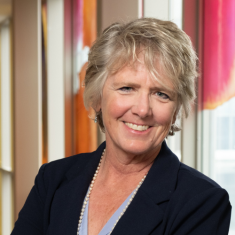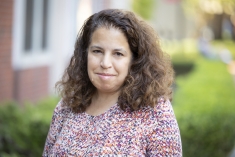Rutgers Law Clinics Welcome New Associate Deans
Rutgers Law School’s clinics in Camden and Newark have a long-standing reputation for excellence. This year, the program is set to advance further with the appointment of two new associate deans for clinical education: Sandra Simkins in Camden and Randi Mandelbaum in Newark.
Here, get to know the new deans, learn about their goals for clinical education at Rutgers Law, and discover what’s in store under their leadership.
Sandra Simkins, Associate Dean for Clinical Education, Camden

Professor of Law Sandra Simkins is returning to the role of associate dean for clinical education after a hiatus of several years. As the director and co-founder of the Children’s Justice Clinic, a former MacArthur Grant recipient, and Department of Justice Due Process Monitor, Simkins brings with her a wealth of experience, including valuable insights gained from managing Rutgers Law’s externship program, teaching legal writing, and serving as dean of students.
“What appealed to me most about returning to this role was the amount of expansion that has happened over the past couple of years,” she says. Previously focused on honing direct representation skills, Rutgers Law's clinics have expanded their offerings thanks to increased funding. Now, students can explore additional clinical opportunities in legislative advocacy, entrepreneurship, medical/legal partnerships, and more. “Clinic remains the best experience you can have in law school, and it’s the most exciting capstone experience because it’s the only place where students get to be lawyers serving real clients with real cases and high stakes,” says Simkins. “Clinic has always been amazing but, with new funding, we’ve been able to create new programs, which is exciting.”
Simkins is also excited about investing in the next generation of clinical teachers and supporting them in their own scholarship. The large number of clinicians at both law schools presents a great opportunity for new clinicians to create a community and learn from each other while they teach students and represent clients. Additionally, one of Simkins’ key goals going forward is to foster a sense of community among clinic students. “I want to create opportunities for students to learn not just from their own clinic experiences, but also from other students in different clinics,” she explains.
Randi Mandelbaum, Associate Dean for Clinical Education, Newark

Randi Mandelbaum, professor of law and founding director of the Child Advocacy Clinic, most recently served as deputy director of clinical education on the Newark campus. As such, stepping into the role of associate dean was a natural progression. “It’s an honor and a privilege to lead what I’ve always believed is a wonderful and strong clinical program,” she says.
Mandelbaum's immediate focus is on launching two new clinics in Newark: the Ruth Bader Ginsburg Women’s Rights and Gender Justice Clinic, supported by a generous external grant, and the Mediation Clinic, funded by the New Jersey State Bar Foundation. “We’re expanding rapidly, so I want to ensure these new clinics have a strong footing and are able to thrive,” she explains. This involves securing appropriate office space and hiring and onboarding new staff. She also expressed the need to support junior clinicians, who are now on the tenure-track. “These faculty members now have the added responsibility of conducting research and publishing scholarship,” Mandelbaum notes. “I want to make sure they are fully supported.”
In addition to these immediate goals, Mandelbaum is committed to the ongoing growth of the clinical program. She faces the challenge of balancing a high demand for clinical opportunities with limited available spots, all while ensuring that the Newark clinics continue to meet the needs of the local and statewide community. “Clinical education serves a dual purpose: training law students to be excellent and reflective practitioners, while also addressing community needs,” she explains. “My goal is for our programs to continue to grow and evolve in a way that supports this dual mission.”